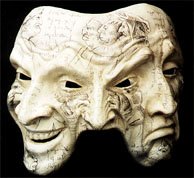 A collision was inevitable. On the the one hand, my propensity toward skepticism compounded by a bittersweet departure from the ministry, left me sensitized to every spiritual hiccup in the Body of Christ. And, as you know, there’s no shortage of buffoons, charlatains, hypocrites and buzzards in the Church. What with a world gone haywire, I was having a cynical field day. The one monkey wrench — the Bible is very clear about a believer’s posture toward life, in particular, church life.
A collision was inevitable. On the the one hand, my propensity toward skepticism compounded by a bittersweet departure from the ministry, left me sensitized to every spiritual hiccup in the Body of Christ. And, as you know, there’s no shortage of buffoons, charlatains, hypocrites and buzzards in the Church. What with a world gone haywire, I was having a cynical field day. The one monkey wrench — the Bible is very clear about a believer’s posture toward life, in particular, church life.
The uncomfortable fact is: It’s difficult reconciling Christian virtue with jaded negativity.
The Book of Ecclesiatstes is the closest thing we have in Scripture to sanctified cynicism. It’s considered part of the Poetical Books and grouped along with Job, Psalms, Proverbs, Song of Solomon and Lamentations. Ecclesiastes puts a notoriously dark spin on things. Perhaps the best example (and one every cynic should take wicked delight in) occurs early on in the book:
I saw the tears of the oppressed — and they have no comforter; power was on the side of their oppressors — and they have no comforter. And I declared that the dead, who already died, are happier than the living, who are still alive. But better than both is he who has not yet been, who has not seen the evil that is done under the sun. (Eccl. 4:1-3 NIV)
Yikes! That’s some grim stuff. The dead are happier than the living? Better off that we’d never been born? Sheesh! This type of talk is liable to land someone in therapy. Either that or launch a  career into goth music stardom.
career into goth music stardom.
The word “meaningless” occurs over thirty times in Ecclesiastes. In fact, the author cuts right to the chase in chapter 1:
‘Meaningless! Meaningless!’ says the Teacher. ‘Utterly meaningless! Everything is meaningless.’ (vs. 2)
And he maintains this existential rant throughout the book, pummeling the reader:
Wisdom is meaningless — 1:12-18
Pleasure is meaningless — 2:1-11
Hard work is meaningless — 2:17-26
Wealth is meaningless — 5:8-6:12
Youth and vigor are meaningless — 11:7-10
Pass the Prozac. The Teacher has surely lost his marbles. Nevertheless, this is God’s Word!
So does Scripture validate, even endorse, jaded negativity?
A general rule of hermeneutics is context. Solomon is generally believed to have written Ecclesiastes. At one time, Solomon was considered the wisest man on earth, having amassed untold wealth, power and fame. Nevertheless, he took unto himself pagan wives, embraced their idolatries, surrendered to sensual pleasure and materialism and, in the end, succumbed to despair and disillusionment. According to Jewish tradition, Solomon wrote Song of Songs during his youth, Proverbs in his middle years and Ecclesiastes during the latter years of his life. The book, more than likely, chronicles the disenchantment and futility of his departure from God.
Another interesting note about Ecclesiastes is its summation:
Now all has been heard; here is the conclusion of the matter: Fear God and keep His commandments, for this is the whole duty of man. For God will bring every deed into judgement, including every hidden thing, whether it is good or evil. (12:13-14)
So after twelve chapters lamenting the meaninglessness of life, Solomon returns to his roots — to sanity. When all is said and done — the injustice, foolishness, oppression, laughter, labor and death — we should fear God and keep His commandments.
As much as I’d like to use Ecclesiastes to support some type of sanctified cynicism, I cannot. For one thing, it won’t allow it. For another, there’s verses like Philippians 4:8:
Finally, brothers, whatever is true, whatever is noble, whatever is right, whatever is pure, whatever is lovely, whatever is admirable — if anything is excellent or praiseworthy — think about such things. (NIV)
Does this mean I can’t think about crime and poverty and wolves in sheeps clothing? Does this mean I can’t cry out when the righteous suffer, when the unborn are slaughtered and when the wealthy strongarm the weak? Does this mean my heart can’t break for ministers who are being eaten alive by their churches? No. It just means I can’t stay there.
Philippians 4:8 (and many like it) is a pebble in the sandal of the jaded negativist. For amidst all the cynical fodder, there is goodness and beauty and hope. On these we are called to think. And so, for those of us prone to pessimism, a collision is inevitable…















I love Ecclesiates- there is so much truth in there. Like when he talks about how you work hard your whole life to earn things your offsping will just squander when they inherit it- so true! It’s all focus. Looking at the world, at temporal things, there is plenty to be cynical about. Our minds needs to be on the higher, spiritual plane, the big picture, eternity. When we do that, we are more able to see the beauty around us.
I can so appreciate your journey, Mike, and recall from Ecclesiastes ‘to everything there is a season’–even our seasons of jaded negativism. May none of us stay there, but look to the Author and Finisher of our faith through it all. I’m going through my own disenchantment, for lack of a better word, but God is ‘sorting me out’ and bringing me to a deeper realization of who He really is. Everything else is truely meaningless without Him.
God bless you and thanks for sharing your life with us.
Hey Janet and Vicki, thanks for the comments. Janet, some of my all-time favorite Bible verses are in Ecclesiastes. Like “…even a live dog is better than a dead lion” (9:4). This gives hope to all us Chihuahuas.
Dear Vicki, I noticed you mentioned recently on one of your sites (I think) that you were having some tough emotional times. I appreciate your continued encouragement and positive outlook. No doubt this is indicative of a heart rightly yielded. Lord bless you both!
I have been trying to put my thoughts to words. There are a few situations occuring as I type that I have allowed to hold me captive and your posts are quite timely.
What I’m trying to spit out here is a genuine, from the heart, and from that painful place that lessons seem to hit…Thank you.
“No. It just means I can’t stay there.” … what separates those who trust in Whom they cannot see from those who don’t.
Ecc 4:1-3 … Uhhhh … tough place to be … one I never thought someone like me could find themself in … yep, needed that therapy … and a divorce from what kept me there.
Everything is meaningless? Prozac? Yes. No; but there’s some other good stuff out there that works, too! God bless the pharmaceutical companies 😉
What brought Solomon to this place is not necessarily what brings others to the same place.
Ecc, from a different light, validates reality for some of us who can feel his words … and it brings us hope … from out of the depth of meaningless life is a well of Life found in God.
Phil 4:8 … a verse my counselor brought to my attention over and over and over again … the hope from the well of Life 🙂
Great post, Mike. Thanks for your willingness to share and in doing so to hold yourself accountable. It’s not that we’re perfect; it’s what we choose to do with our imperfection.
Mike,
This whole series has been excellent. I’m a preacher’s kid and my brothers are preachers, too — I know how the church can hurt its own. I appreciate your honesty and your faithfulness through the doubt and trial. I’m coming to realize more and more that we don’t really appreciate joy until we’ve experienced the opposite.
Mike ~ just wanted to thank you for your comment to my comment:-) I think we all appreciate when people are being real. God bless you.
Great thoughts, Mike. I’ve actually heard a sermon on the life of Solomon. There is truth to Ecclesiastes. Apart from God, all in meaningingless. For without God, we are nothing.
I guess the key is to stay focused on God rather than men. For God is the one constant. The only unchanging One.
Thanks, Mike!